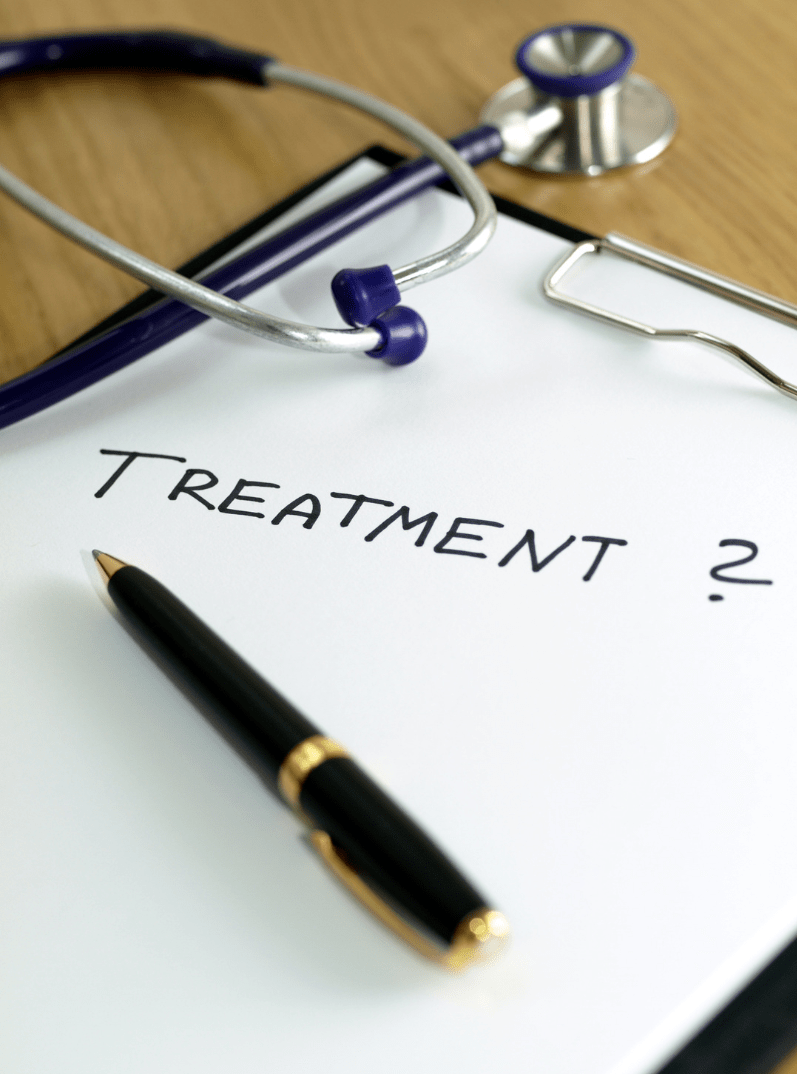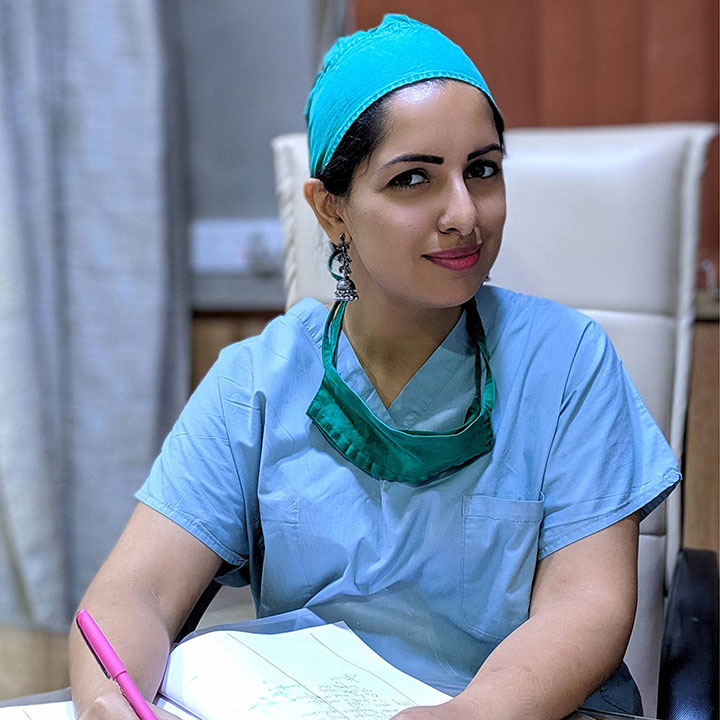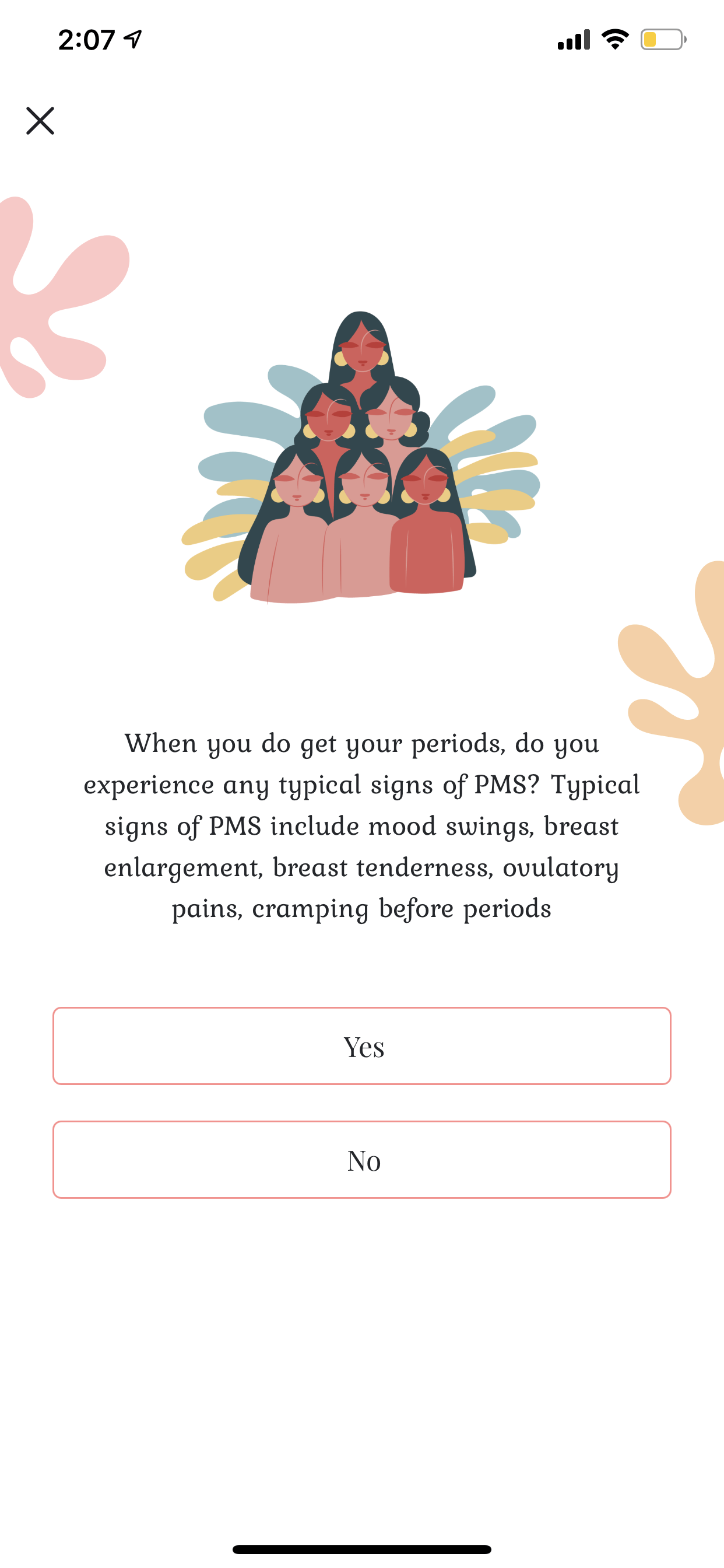A menstrual cycle consists of all the days from the beginning of one period to the first day of the next period. The average menstrual cycle lasts 28 days, but this can vary from person to person depending on a lot of factors like stress, weight gain, weight loss, birth control methods and so on. If your periods last between 21 to 40 days, it is still considered to be regular periods. Irregular menstruation is when the interval between period cycles changes and you get your periods sooner or later than usual.
What is the main reason for irregular periods?
Finding out the cause is the first step in treatment for irregular periods. Some of the common causes are as follows:
1. Hormonal Imbalance:
Girls who have recently started menstruating or women who are approaching menopause are most likely to experience hormone imbalances. Due to an excess presence of hormones like progestin and/or estrogen which regulate the lining of the uterus, heavy bleeding may be experienced.
2. Polycystic ovary syndrome (PCOS):
In polycystic ovary syndrome (PCOS), the ovaries produce a considerable amount of androgens, which are male hormones. In the ovaries, small fluid-filled sacs (cysts) can form. These are frequently visible on ultrasonography. Ovulation may not occur regularly due to hormonal changes that prevent eggs from developing. Women with polycystic ovary syndrome may experience irregular periods or cease menstruation entirely.
3. Stress and lifestyle issues:
Significant weight loss or gain, excessive dieting, changes in physical activity level, travel, illness, mental and emotional stress and other interruptions in a woman’s daily routine can all affect her menstrual periods.
4. Fibroids or uterine polyps:
Uterine fibroids are benign tumours that grow within or are attached to the uterine wall. One or more fibroids, ranging in size from an apple seed to a grapefruit, may be present. Although harmless, these tumours can cause excessive bleeding and pain during periods. If the fibroids are large, they may put pressure on the bladder or rectum, creating discomfort.1
5. Pelvic inflammatory disease (PID):
Pelvic inflammatory disease (PID) affects the female reproductive system and is caused by a bacterial infection. Bacteria can enter the vagina during sexual contact and subsequently travel to the uterus and upper genital tract. Bacteria can also get into the reproductive tract through gynaecological procedures, childbirth, miscarriage, or abortion. Heavy vaginal discharge with an unpleasant odour, irregular periods, pelvic and lower abdominal pain, fever, sickness, vomiting, and diarrhea are all symptoms of PID.
Irregular periods treatment:
Can irregular periods be treated? Yes, they can! You can try a number of treatments for irregular periods at home to help your cycle return to normal. The best treatment for irregular periods backed by research are listed below:
1. Yoga:
A variety of menstrual problems can be successfully treated with yoga. 35 to 40 minutes of yoga per day or five times per week, may aid in hormone and menstrual cycle regulation. Yoga may also aid in the natural treatment of premenstrual symptoms. In addition to reducing monthly pain and emotional symptoms such as anxiety and depression in women with primary dysmenorrhea, yoga has also been found to improve women’s quality of life.
2. Exercise:
Exercise can help you lose weight, which can help you regulate your hormones and manage your menstrual cycle. It might also help you have milder PMS, feel better before and throughout your period. It has plenty of other health benefits that can help you reach or maintain a healthy weight, and it’s frequently prescribed as part of a polycystic ovary syndrome (PCOS) treatment plan.
3. Vitamin supplements:
Did you always wonder, what deficiency causes irregular periods? An analysis of a 2015 study linked low vitamin D levels to irregular cycles, which suggested that taking vitamin D might improve menstruation. Some foods, such as milk and other dairy products, as well as cereal, are fortified with vitamin D. Vitamin D can also be obtained via safe exposure to the morning sun or by supplementation. Those who are trying to conceive are frequently given B vitamins. They may help regulate periods, but further research is needed to support these claims.2
What is the treatment for irregular periods after delivery?
Hormonal birth control could help regulate postpartum periods. These methods include hormonal IUDs, injections, implants, and pills containing progestin or only estrogen. Some birth control options can stop a woman’s period or cause less frequent periods. Breastfeeding women may be concerned about the effects of birth control on the baby or their ability to produce breast milk, but there are no significant differences in breastfeeding and milk production. While hormonal birth control is safe to use while breastfeeding, it is still necessary to consult your doctor before starting any new medication.3
What is the treatment for irregular periods when trying to conceive?
If you are ovulating, you can become pregnant; but if you have irregular periods, your chances of getting pregnant may be less than those of a woman with regular periods. The most crucial thing is to have regular unprotected sex. Try to engage in sexual activity at least once every two to three days.
Treating any underlying medical conditions influencing your fertility may improve your chances of getting pregnant. Your doctor might prescribe clomiphene citrate (Clomid) to stimulate ovulation. It has been discovered that Clomid is an effective medicine to induce ovulation. Additionally, it has shown positive results when used by women having PCOS. It may have side effects like hot flashes, tender breasts, abdominal bloating, and the release of multiple eggs in one cycle. Consult your doctor to get adequate treatment if you have other underlying issues like PCOS or thyroid. You might require PCOS treatment for irregular periods and also medications to increase your thyroid hormones or block it.4 Medications along with changes in diet, physical activity, lifestyle and stress management play a key role in trying to conceive with irregular periods.
Which medicine is best for irregular periods?
Medroxyprogesterone is a medicine used for treating irregular periods. It belongs to the class of progestins, which is used to treat irregular vaginal bleeding or irregular periods. It also brings back a normal menstrual cycle in women who previously had a regular cycle.
Women who have not menstruated for at least six months, are not pregnant or have menopause can use this medicine. It is also used to prevent overgrowth of the uterine lining and may lower the risk of uterine cancer in patients taking estrogen. It also works by stopping the growth of the uterine lining by causing the uterus to produce specific hormones.
Medroxyprogesterone is available as an oral tablet. It is generally taken once a day on specific days of a regular monthly cycle. You can take it around the same time every day on the days you are scheduled to take it and use it according to the dose prescribed by your doctor. Follow the directions on the prescription label as directed, and ask your doctor or pharmacist to explain any instructions you can’t understand.
Medroxyprogesterone may control your condition but can’t cure it. Continue using medroxyprogesterone according to your monthly schedule. You should not stop using the medicine without consulting your doctor.
Tell your doctor if you are allergic to the medication and about the prescription and nonprescription medicines, vitamins, nutritional supplements, and herbal products you are taking. You must also tell them about your gynac and medical history, and if you are having surgery, including dental surgery, tell your doctor or dentist that you are taking medroxyprogesterone.
Medroxyprogesterone may have some side effects. Always inform your doctor if you are experiencing any of these symptoms:
- Tender breasts that produce a liquid
- Changes in menstrual flow
- Irregular vaginal bleeding or spotting
- Acne
- Growth of hair on the face
- Loss of hair on the scalp
- Difficulty falling or staying asleep
- Drowsiness
- Upset stomach
Consult your doctor if you are experiencing any other side effects after taking this medicine.5
What happens if periods are irregular?
Generally, irregular periods are not harmful. However, persistent or long-term irregularity may increase the risk of other conditions. Hence, it is necessary to find the cause of irregular menstruation and solution.
Long-term irregular periods can cause conditions such as
- Infertility – Having irregular periods can cause anovulation, which happens when the body does not release an egg. Hence, due to this, you may have difficulty getting pregnant.
- Osteoporosis – Ovulation is a source of estrogen, which helps in keeping your bones strong. So if you are not ovulating, you can be at a higher risk of osteoporosis because of having less estrogen in your body.
- Cardiovascular disease – Similarly, a lack of estrogen in your body can increase the risk of cardiovascular diseases.
- Endometrial hyperplasia – If you have irregular periods for a long time without taking any treatment, it may increase your risk of having endometrial hyperplasia. It happens when the uterus lining becomes unusually thick, increasing the risk of endometrial cancer.6
Do irregular periods mean infertility?
Your irregular periods could be a part of the reason for your infertility, but this is not always the case. However, at the very least, it could mean that you may have had fewer times to get pregnant. This makes it more difficult to time your intercourse. Try to track your cycle to determine when you ovulate. You can consult a doctor with expertise in evaluating your infertility. You can have irregular periods due to PCOS, Hyperthyroidism, Hypothyroidism, Hyperprolactinemia, stress and lifestyle and other conditions.
A less common condition known as primary ovarian insufficiency or POI involves the loss of normal ovarian function before age 40. Women having this disorder might have irregular or occasional periods for years. Other causes of irregular periods that could affect fertility include excessive exercise, eating disorders, injury or tumours. Don’t worry because all of these conditions are treatable.
The main concern with irregular periods is that the condition may occasionally cause irregular or absent ovulation. Moreover, you cannot become pregnant if you don’t ovulate. This concludes that if you have irregular periods, it does not mean you won’t be able to have a healthy pregnancy.7
Is it normal to skip your period for three months?
If you have missed your periods for at least three months, or your menses stopped for six months when they were previously irregular, talk to your doctor. This condition is known as secondary amenorrhea. It is frequently a sign of a treatable condition. Your regular menstrual cycle should return after taking treatment. It may be either temporary or permanent, caused by a problem or change in the function of a part of the female reproductive system. Secondary amenorrhea should be investigated if it lasts for more than three months.
The risk factors of amenorrhea are:
- If you have a family history of amenorrhea or early menopause
- A genetic or chromosomal condition that impacts your menstrual cycle
- Obesity or underweight
- Eating disorder
- Over-exercising
- Poor diet and stressful lifestyle
- Chronic illness
The common cause of secondary amenorrhea are:
- Pregnancy
- Breastfeeding.
- Menopause.
- Some birth control options, like Depo Provera, intrauterine devices (IUDs), and birth control pills.
- Radiation and chemotherapy for cancer.
- Previous uterine surgery with subsequent scarring
The common symptoms of secondary amenorrhea are:
The main symptom is an absence of periods, while other symptoms depend on this cause. You may have symptoms like:
- Hot flashes
- Nipples leaking milk
- Vaginal dryness
- Headaches
- Vision changes
- Acne
- Excessive body and facial hair growth
Treatment options for secondary amenorrhea are:
If you have missed periods because of menopause or pregnancy, your doctor will not need to treat it. In other cases, your course of treatment will depend on the cause and may include:
- Losing weight through diet and exercise (if excess weight is the cause).
- Gaining weight through a customised diet plan (if extreme weight loss is the cause).
- Stress management techniques
- Changing your exercise levels
- The hormonal treatment prescribed by your doctor
- Surgery (in rare situations)
You can prevent missed periods by maintaining a healthy weight, eating a healthy diet, being aware of your menstrual cycle, getting regular gynaecological appointments, having a pelvic exam and pap tests, and getting adequate sleep.8
At what age do periods become irregular?
You may notice your periods becoming irregular sometime in your 40s. However, some women notice changes in their mid-30s. This period of time is called Perimenopause (around menopause). It refers to a time when your body naturally transitions to menopause, signalling the end of your reproductive years.
The estrogen levels in your body rise and fall unevenly during this time. Your menstrual cycles may become longer or shorter, and you may begin to have cycles in which your ovaries do not release an egg (ovulate). You may also have menopause-like symptoms such as vaginal dryness, sleeping problems, and hot flashes. There are treatments available which can relieve these symptoms.9
We can also observe irregular menstrual cycles in teenagers when they first begin. It is common to have long, irregular cycles for the first few years after menstruation begins. The unpredictability during this period is due to anovulatory cycles. It means that the body does not ovulate every month. It is common in teenagers since their bodies have not yet settled into a pattern of regular menstrual cycles. Their cycles should become shorter and more predictable with time.
But if a girl has her first period and doesn’t have another for nearly a year, it has to be evaluated. Your doctor can recommend blood tests or imaging exams, like abdominal ultrasound or a pelvic examination, to see if an underlying condition is responsible for irregular periods. It is also necessary to consult your doctor to get the necessary treatment for irregular periods in teenage girls.10
Before starting on any home remedies for irregular periods, you should understand the irregular periods reasons; consult your gynaecologist first to understand the cause of your irregular periods. There are several medical treatments for this, but it depends on why your periods are irregular in the first place. For example, your doctor may prescribe hormonal birth control if the irregularity is due to PCOS. However, if it is due to pelvic inflammatory disease (PID), you will be treated for PID instead!
Period irregularities can also be caused by certain medications and health problems. A doctor will be able to diagnose the problem and suggest better medical treatment for irregular periods in such a case. People who want to get pregnant but have irregular periods should watch when they ovulate and consult a doctor. 11
Are you worried that you have irregular periods? Download the Pinky Promise App and consult with a gynaecologist @ ₹50/- only! Check out the app for free symptom assessment on our gynaecologist-verified chatbot to understand more about your reproductive health symptoms. You can also talk about your problems anonymously in our chatrooms with other community members for FREE!






